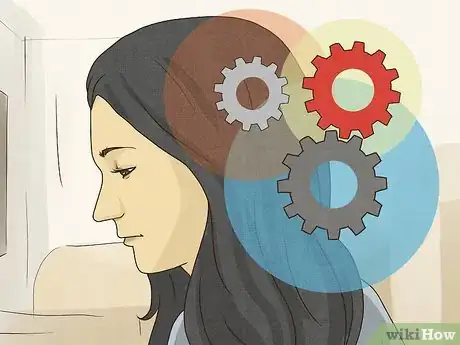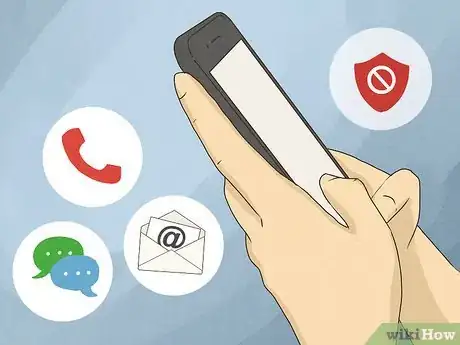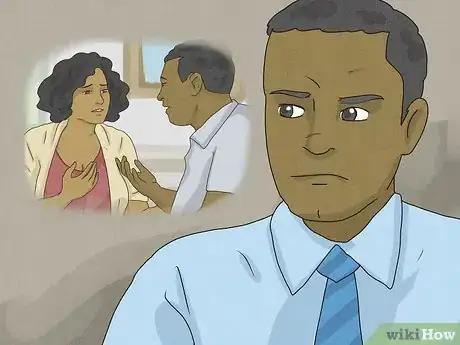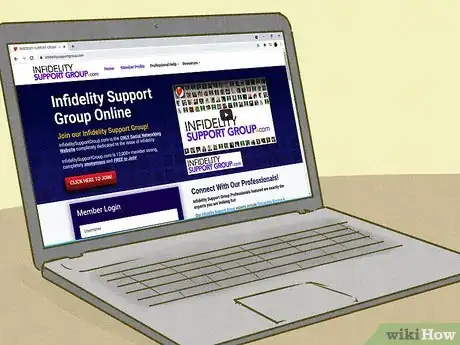This article was co-authored by Lauren Urban, LCSW and by wikiHow staff writer, Janice Tieperman. Lauren Urban is a licensed psychotherapist in Brooklyn, New York, with over 13 years of therapy experience working with children, families, couples, and individuals. She received her Masters in Social Work from Hunter College in 2006, and specializes in working with the LGBTQIA community and with clients in recovery or considering recovery for drug and alcohol use.
There are 10 references cited in this article, which can be found at the bottom of the page.
This article has been viewed 102,421 times.
Coping with the aftermath of an affair is never easy, especially if your partner emotionally cheated on you. Unlike sexual affairs, an emotional affair involves a secret, emotionally intimate relationship, which is just as painful and devastating to uncover. Forgiving an emotionally unfaithful partner is no easy task, but it’s not out of the question, either.
Here are 12 steps you can take to forgive your partner and find the healing you need.
Steps
Expert Q&A
Did you know you can get expert answers for this article?
Unlock expert answers by supporting wikiHow
-
QuestionWhy do people cheat emotionally?
 Lauren Urban, LCSWLauren Urban is a licensed psychotherapist in Brooklyn, New York, with over 13 years of therapy experience working with children, families, couples, and individuals. She received her Masters in Social Work from Hunter College in 2006, and specializes in working with the LGBTQIA community and with clients in recovery or considering recovery for drug and alcohol use.
Lauren Urban, LCSWLauren Urban is a licensed psychotherapist in Brooklyn, New York, with over 13 years of therapy experience working with children, families, couples, and individuals. She received her Masters in Social Work from Hunter College in 2006, and specializes in working with the LGBTQIA community and with clients in recovery or considering recovery for drug and alcohol use.
Couples Counselor
References
- ↑ https://www.psychologytoday.com/us/blog/between-the-sheets/201809/how-the-other-woman-or-man-fares-after-affair
- ↑ https://www.mayoclinic.org/healthy-lifestyle/adult-health/in-depth/infidelity/art-20048424
- ↑ https://www.goodtherapy.org/blog/recovering-from-infidelity-why-does-forgiveness-feel-so-dangerous-1019174
- ↑ https://www.nbcnews.com/better/lifestyle/how-repair-your-relationship-after-someone-cheats-ncna980776
- ↑ https://www.nbcnews.com/better/lifestyle/how-repair-your-relationship-after-someone-cheats-ncna980776
- ↑ https://www.goodtherapy.org/blog/tips-to-survive-an-emotional-affair-0111164
- ↑ https://www.nbcnews.com/better/lifestyle/how-repair-your-relationship-after-someone-cheats-ncna980776
- ↑ https://www.psychologytoday.com/us/blog/the-forgiving-life/201803/how-do-i-forgive-cheating-boyfriend-six-suggestions
- ↑ https://www.psychologytoday.com/us/blog/resolution-not-conflict/201111/recovery-affair-what-both-spouses-need-heal
- ↑ https://northsidementalhealth.com/affair-fallout-recovery-part-4/
- ↑ https://www.psychologytoday.com/us/blog/love-and-sex-in-the-digital-age/201703/after-cheating-restoring-relationship-trust
- ↑ https://www.mayoclinic.org/healthy-lifestyle/adult-health/in-depth/infidelity/art-20048424
- ↑ https://www.ocregister.com/2015/04/21/cheatingsupportcom-where-cheaters-and-those-who-have-been-cheated-on-can-find-infidelity-help/
- ↑ https://www.mayoclinic.org/healthy-lifestyle/adult-health/in-depth/infidelity/art-20048424
About This Article
Emotional cheating can be difficult to forgive since it involves emotional intimacy and bonding, which isn't as clear-cut as a sexual affair. To work towards forgiveness, try telling your partner how the affair made you feel, which will help you move on emotionally. You should also ask your partner to cut off all contact with the other person, since this will help you both move on. If you're still concerned about partner's behavior, request that they take steps to rebuild your trust, like letting you see their emails or telling you where they'll be when they go out. Once you feel ready to do so, simply tell your partner, “I forgive you.” For tips from our Counseling co-author, including how to engage a therapist to help, read on!








































































